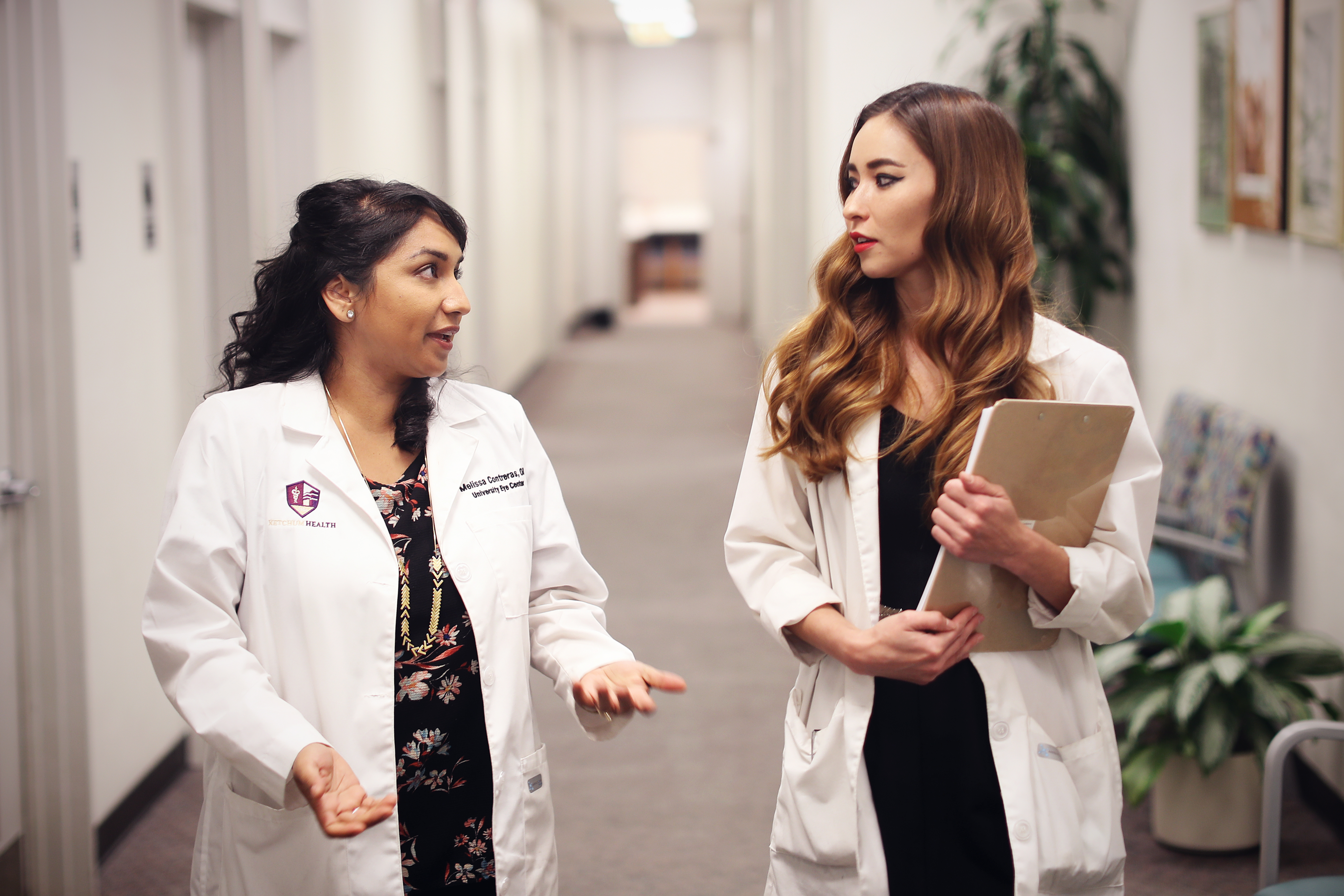Quarterly wet labs give the gift of clear vision to patients and advanced education to MBKU students.
The University Eye Center at Ketchum Health in Los Angeles is a bedrock for vision care in the local community.
The clinic opened in 1972 when the Southern California College of Optometry moved from Los Angeles to Fullerton. The mission was to serve the South Los Angeles community's eye care needs as well as provide patient care experience to support the students' education. Originally called the Optometric Center of Los Angeles, the clinic was established through a U.S. Department of Public Health Special Improvement grant and from the day it opened, the patient load has continued to grow.
Located south of downtown Los Angeles, 31% of the patients who come to the University Eye Center live below the poverty line. Eye care in many cases is not financially viable. However, with the help of grants and resources, and thanks to the dedication of faculty leaders, staff and students, for more than 40 years the center continues to transform the lives of the patients who have nowhere else to go.
A CHALLENGING ROTATION
One of the ways the University Eye Center serves patients is through quarterly wet labs. Held in collaboration with contact lens providers and supported by grants, these events give hands-on experience to fourth-year students of the Southern California College of Optometry at Marshall B. Ketchum University. For patients who can't afford necessary contact lenses and fitting, it is a life-changing experience.
Melissa Contreras, OD, '10, Clinic Director and Assistant Professor at SCCO, explains that patients with specific, often rare disorders are carefully selected to participate.
“As a teaching facility, a student doctor performs the examination in collaboration with the faculty doctor. It is a little longer, but patients tell us this is the most comprehensive exam they've ever received,” she says. “It is also an educational experience for the patient, who has the opportunity to better understand their condition.”
Lisa Wahl, OD, '13, Coordinator of the Cornea and Contact Lens department at the University Eye Center and an Adjunct Professor at SCCO, specializes in the fitting of contact lenses for irregular corneas and ocular surface disease, including scleral and hybrid lenses. As an SCCO alumnus, she says that one of her most fulfilling roles is precepting fourth-year optometry students in a multifaceted optometry setting.
"This is a challenging rotation and I guarantee students will see new pathologies or contact lens that they wouldn't have seen elsewhere," she says.
A YOUNG LIFE CHANGED
Chad Roberson, a 19-year-old college student and football player, presented a unique case that made him an ideal wet lab candidate. He experienced a big change in his eyesight that was no longer correctable with glasses nor soft contact lenses. He experienced blurriness and intense migraine headaches, which interfered with his ability to pay attention in class and focus on the football field. His mother, a patient at the University Eye Center, brought him in for an appointment.
During his fourth-year rotation at the center, Michael Tran, SCCO '17, and Dr. Wahl met with Chad to assess his case.
Using corneal topography, Dr. Wahl diagnosed Chad with keratoconus. Keratoconus is a progressive disease that thins and distorts the cornea. Prevalent among Latino and African-American boys, it can occur in one or both eyes and begins in adolescence or early 20s.
"Chad had just started college and playing football," Dr. Wahl says. "He'd never worn contact lenses and with his sports activities, soft lenses, which drape over the eye, were not sufficient to provide him the best vision correction."
At a wet lab hosted by SynergEyes, Chad volunteered to be fitted with hybrid lenses that he could use comfortably every day. After the fitting, he now enjoys the comfort of a soft lens with the hard center that gives him 20/20 vision and will not be dislodged while he plays football.
"I get better grades and I do better on the field," Chad says. "Dr. Wahl was very calm and gentle and she helped me get the right contacts and the right fit."
A WEALTH OF KNOWLEDGE
For Dr. Tran, it was a great experience that prepared him for the next phase in his optometry career. "The doctors give us autonomy in our exams with the expectation that we identify the right diagnosis and treatment," Dr. Tran says. "They help guide us if we're off track."
When students complete their rotation, Dr. Contreras is confident that their experiences with complex patient cases will give them a wealth of knowledge they can take into their next chapter as practicing optometrists.
"They will have seen conditions that they wouldn't normally see in the general population and they will know exactly what to do with it," Dr. Contreras says. "It's a win-win situation," she explains. "Our students get experience with specialty lenses and the patient gets a contact lens fitting and lenses at a lower cost."

